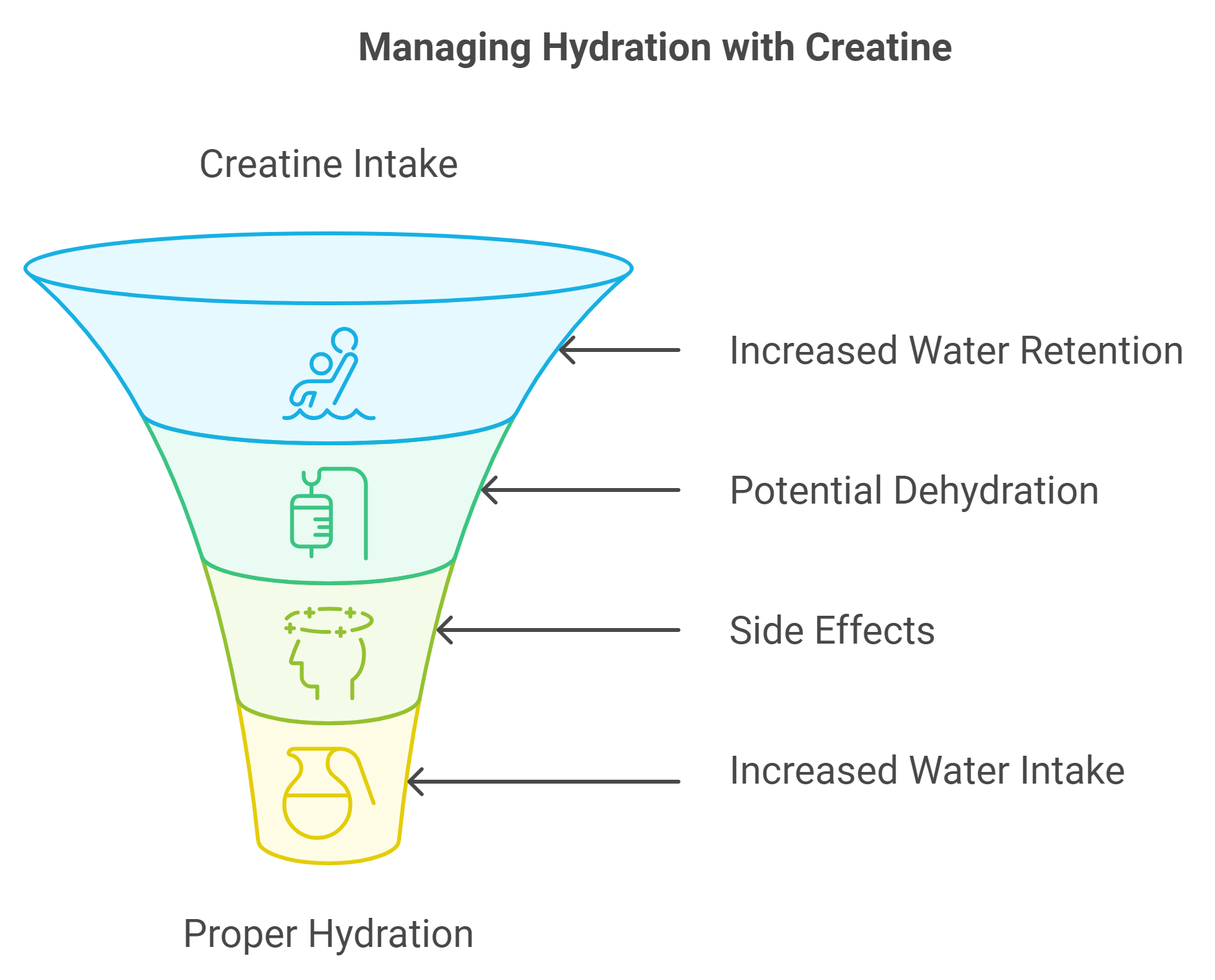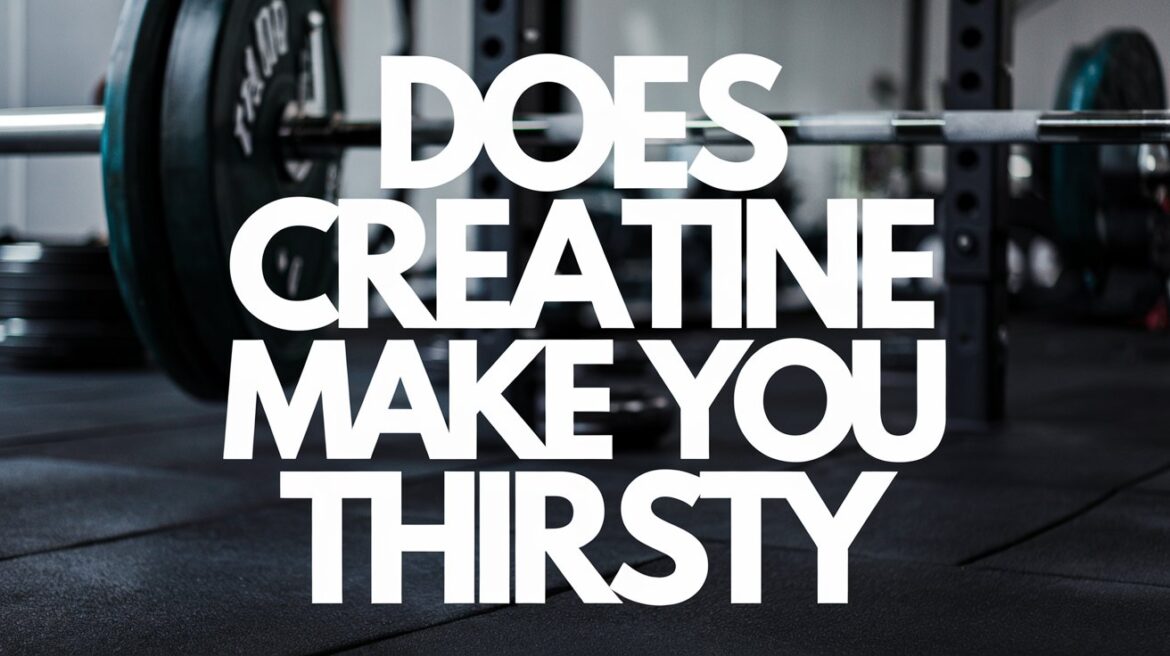INTRO
Creatine is today among the most widely used sports supplements for athletes and sports enthusiasts who would want more boost in performance, mass growth, and general strength.
Undoubtedly, the supplement has many advantages. But people always want to know,
Does creatine make you thirsty?
This is because it is very important to understand the link between creatinine and hydration since drinking sufficient water can help to avoid possible adverse side effects which may include increased thirstiness, dehydration, or muscle cramps from ingestion of creatine.
The blog serves as our platform for examining how creatine affects body fluid levels and we will provide guidance on what you should do such that while taking creatine on the one hand; on the other hand, you are well-hydrated
What is Creatine?
Creatine is a naturally arising substance of the cells made up of three amino acids, the majority of which are stored in muscles and the brain. It is commonly used as an enhancer for exercise together with building muscle.
Creatine can be gotten from foodstuffs like meat and fish and sometimes you can also decide to use it as a supplement to help you be buff in your sports activities.
How Does Creatine Work?
The way creatine works is by the process of increasing ATP, or adenosine triphosphate storage in the cells which is vital for powering the body’s energy needs. Through increased ATP availability, creatine affords the necessary strength during vigorous exercises such as lifting weights and running sprints, and thus you can tire easily yet the real fun test and betterment effect is achieved more easily than before.
Hydration and Creatine: Understanding the Connection
Figuring out how Creatine Affects Hydration
Creatine is famous for its water-attracting property, which allows the cells to store more water and consequently, grow and perform better. However, the muscle’s water content is increased, and if the rest of the body’s water is instead, the rise in the intramuscular water volume will be decreased.
One example of inadequate muscle water supply is the relationship between creatine and muscle growth. Many water-consuming processes also depend on the water, which causes these. In the absence of adequate replacements in water balance, a drying-out process takes place.
Correct hydration should be achieved by using creatine supplements to avoid side effects like headaches, dizziness, or muscle cramps. Realize that water is the real thing when it comes to the effective application of creatine, in such cases, water intake should be increased, the one by which creatine works can be also ensured.

Hydration with Creatine: Tips and Tricks
Required Water Intake
Monthly Hydration:
When using creatine, it’s better to drink at least a gallon of water a day to keep yourself hydrated enough as far as muscles and other tissues are concerned.
While Working Out:
Before, during, and after a workout make it a habit to drink fluids to supply your body with the vital substances that it needs and hence, avoid dehydration.

Monitoring the Water Intake
Always see that you drink water whenever you feel your throat dry. The message it sends is ‘Whoa, I need water’. “I need water”.
The dark yellow color of urine is an indicator of insufficient water, while the clear or pale yellow indicates the recommended water supply.
The Advantages of Consuming Creatine with Adequate Hydration
Proper hydration is important for maximizing the benefits of creatine. Appropriate water intake of creatine supports the muscle-enhancing properties of creatine still reducing the risk of side effects, such as stomach upset, bloating, or water retention.
FAQs:
Addressing Common Concerns About Creatine and Hydration
Does Creatine Cause Dehydration?
Creatine indeed adds water-based productivity to the muscles, but it has nothing to do with dehydration per se. However, the increasing water content in the muscles can u to get dehydrated if you don’t replace the lost water by drinking.
How Much Water Should I Drink While Taking Creatine?
You should drink at least one gallon of water a day considering your activity level and the body’s requirements.
What Are the Signs of Dehydration While Taking Creatine?
Specific symptoms include dry mouth, dark-colored urine, dizziness, fatigue, and muscle cramps. It is essential to stay hydrated to resist these.
Does Creatine Make Muscles Retain Water?
Yes, it makes the muscles swell up because they have more water in them, meaning that the person may get heavier.
Do I Need to Follow a Specific Diet While Using Creatine?
According to the balanced diet, the guaranteed water intake is the first and necessary condition to supply muscle-building creatine.
Conclusion: Creatine is a great product that adds various advantages to athletes as well as sportspeople. However, being informed about its influence on hydration is the path to fixing unexpected ills. Creatine thus becomes an added convenience with water intake being a priority; thus, the effects are less dehydrating and mostly healthful to us. Regardless of whether you are a professional or a beginner, a well-hydrated body will help you achieve your workout plans efficiently and safely.

